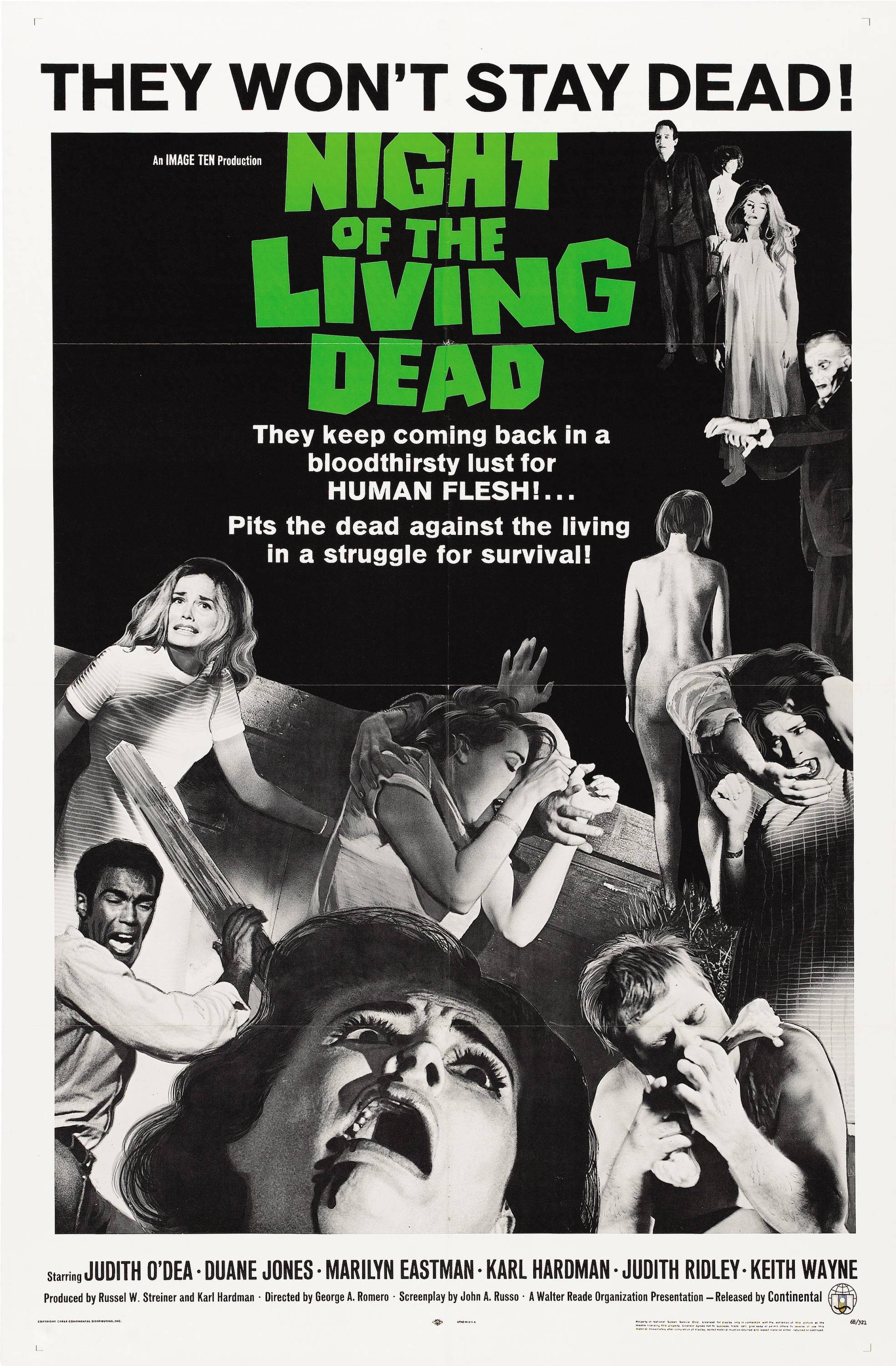Why Do Zombies Eat Brains? At WHY.EDU.VN, we delve into this intriguing question, exploring the origins and evolution of this iconic zombie trope. While the popular image of zombies feasting on brains is prevalent in modern media, the actual reasons behind this behavior are more complex and less straightforward than you might think. Unlock comprehensive insights into zombie lore and discover the answers you seek regarding undead cravings, zombie biology, and pop culture phenomena.
1. The Myth and Reality of Zombie Brain Consumption
The image of zombies relentlessly pursuing and consuming brains is deeply ingrained in popular culture. From movies to video games, the insatiable hunger for brains has become a defining characteristic of these undead creatures. However, the reality behind this trope is far more nuanced and fascinating.
1.1. The Birth of the Brain-Eating Zombie
While George A. Romero’s Night of the Living Dead (1968) is widely credited with popularizing the modern zombie, it’s important to note that his zombies didn’t actually eat brains. These early zombies were simply driven by an insatiable hunger for human flesh. The concept of zombies specifically targeting brains didn’t emerge until much later.
The film Return of the Living Dead (1985), directed by Dan O’Bannon, is generally considered the origin of the brain-eating zombie trope. In this movie, zombies explicitly crave brains, believing that consuming them alleviates their pain. This single film cemented the idea of brain-hungry zombies in the collective consciousness.
 Zombies in Return of the Living Dead craving brains
Zombies in Return of the Living Dead craving brains
1.2. Dan O’Bannon’s Explanation
Dan O’Bannon, the writer and director of Return of the Living Dead, provided a specific reason for the zombies’ brain-eating behavior. He suggested that consuming brains made the zombies feel better, easing their pain and discomfort. This explanation, while fictional, provided a plausible motivation for the zombies’ actions.
1.3. Romero’s Perspective
Despite being the father of the modern zombie, George A. Romero himself was surprised by the brain-eating phenomenon. In a 2010 interview with Vanity Fair, Romero stated that he had never depicted zombies eating brains in any of his films. He expressed amusement at the fact that fans would often ask him to sign autographs with the phrase “Eat Brains,” despite its absence in his work.
2. Exploring the Possible Reasons Behind the Brain Craving
While the initial reason for zombies eating brains was simply a plot device in a horror film, fans and experts have since proposed various explanations for this behavior. These theories range from the scientific to the metaphorical, offering different perspectives on the undead craving.
2.1. Serotonin and the Undead Brain
One popular theory suggests that zombies crave brains because of their high serotonin content. Serotonin is a neurotransmitter that plays a crucial role in regulating mood, appetite, and sleep. It’s hypothesized that the undead, lacking natural serotonin production, seek it out in the brains of the living to alleviate their suffering and regain some semblance of normalcy.
While this theory is intriguing, it’s important to note that it has never been scientifically proven or confirmed by zombie creators. It remains a fan-driven explanation for the brain-eating behavior.
2.2. The Brain as a Source of Life Force
Another explanation posits that zombies consume brains to absorb the life force or consciousness contained within them. In this view, the brain is not merely a source of nutrients but a vessel for the individual’s identity and memories. By consuming the brain, zombies may be attempting to regain their lost humanity or simply experience the sensation of being alive.
This theory aligns with certain interpretations of zombies as metaphors for the loss of identity and individuality in modern society.
2.3. Pure Instinct and Undead Hunger
Perhaps the simplest explanation is that zombies eat brains because they are driven by an insatiable hunger that targets the most readily available and nutritious source of sustenance. The brain, being a soft and easily accessible organ, becomes the primary target of the zombies’ predatory instincts.
This explanation focuses on the biological aspects of zombism, portraying zombies as mindless creatures driven solely by their need to feed.
2.4. Metaphorical Interpretations
Beyond the literal explanations, some interpretations view the brain-eating zombie as a metaphor for various societal ills. The zombies’ relentless pursuit of brains can be seen as a commentary on consumerism, the erosion of intellectualism, or the dangers of conformity.
In this context, the brain represents knowledge, intelligence, and individuality, which are being consumed and destroyed by the mindless horde.
3. The Evolution of the Zombie Brain Trope in Media
The brain-eating zombie has become a staple of popular culture, appearing in countless movies, TV shows, video games, and books. Over time, the trope has evolved and been adapted to fit different narratives and themes.
3.1. From Return of the Living Dead to Modern Zombie Media
Return of the Living Dead established the core elements of the brain-eating zombie trope, including the explicit craving for brains and the belief that consuming them alleviates pain. This film paved the way for future zombie media to explore the concept further.
3.2. Examples in Film and Television
Numerous films and TV shows have embraced the brain-eating zombie trope, often with unique twists and interpretations. Some notable examples include:
- Braindead (1992): This comedic horror film features zombies with an insatiable appetite for brains, resulting in over-the-top gore and slapstick humor.
- The Walking Dead (TV Series): While the zombies in The Walking Dead primarily feed on flesh, the show occasionally hints at a preference for brains.
- Zombieland (2009): This comedy-horror film features a variety of zombie types, some of which exhibit a particular interest in brains.
3.3. Zombie Brains in Video Games
Video games have also played a significant role in popularizing the brain-eating zombie trope. Games like Left 4 Dead, Dead Rising, and Plants vs. Zombies feature hordes of brain-hungry zombies that players must fight off.
3.4. Variations and Subversions
While the brain-eating zombie trope is widely used, some media have subverted or deconstructed it. Some stories portray zombies that crave other body parts, while others explore the psychological effects of being a zombie and the desire to regain one’s humanity.
4. The Science (or Lack Thereof) Behind Zombie Brain Consumption
From a scientific perspective, the idea of zombies eating brains is highly implausible. The human body requires a balanced diet to function properly, and consuming only brains would lead to severe nutritional deficiencies.
4.1. Nutritional Value of the Human Brain
The human brain is primarily composed of fat, protein, and water. While it does contain some essential nutrients, it lacks many of the vitamins and minerals necessary for survival. A diet consisting solely of brains would lead to malnutrition, scurvy, and other health problems.
4.2. Digestive Issues
The human digestive system is not designed to process large quantities of raw brain tissue. Consuming brains could lead to digestive issues, such as nausea, vomiting, and diarrhea.
4.3. The Spread of Disease
Eating raw brains also carries the risk of transmitting diseases. The brain can harbor various pathogens, including viruses, bacteria, and prions, which can cause serious illness in humans.
4.4. The Implausibility of Sustained Undead Existence
Perhaps the biggest scientific hurdle is the very concept of zombism. The idea of a reanimated corpse retaining the ability to move, hunt, and consume food is highly improbable, given the complex biological processes required for these functions.
5. Why the Brain? Exploring the Symbolic Significance
The choice of the brain as the target of zombie hunger is not arbitrary. The brain is the seat of consciousness, intelligence, and individuality. By consuming brains, zombies are symbolically attacking these essential aspects of humanity.
5.1. The Brain as the Seat of Consciousness
The brain is responsible for our thoughts, feelings, and perceptions. It is the organ that makes us who we are. By targeting the brain, zombies are effectively erasing the individual’s identity and reducing them to a mindless state.
5.2. Intelligence and Knowledge
The brain is also the repository of our knowledge and intelligence. By consuming brains, zombies are symbolically destroying the accumulated wisdom and understanding of humanity.
5.3. Individuality and Identity
Each person’s brain is unique, containing a lifetime of experiences, memories, and personality traits. By consuming brains, zombies are obliterating the individual’s unique identity and turning them into just another member of the undead horde.
5.4. Cultural and Societal Implications
The brain-eating zombie can be seen as a metaphor for various cultural and societal concerns. It can represent the dangers of conformity, the erosion of intellectualism, or the dehumanizing effects of consumerism.
6. Debunking Common Zombie Myths and Misconceptions
The world of zombies is filled with myths and misconceptions, many of which have been perpetuated by popular culture. It’s important to separate fact from fiction when discussing these undead creatures.
6.1. Zombies Are Always Slow and Shambling
While slow, shambling zombies are a common trope, not all zombies fit this description. Some zombie stories feature fast, agile zombies that are much more dangerous.
6.2. Headshots Are the Only Way to Kill a Zombie
The idea that a headshot is the only way to kill a zombie is another popular myth. While destroying the brain is certainly an effective way to stop a zombie, other methods, such as fire or dismemberment, can also be used in some stories.
6.3. Zombies Are Always Contagious
Not all zombies are contagious. Some zombie stories portray zombism as a result of supernatural forces or scientific experiments, rather than a viral outbreak.
6.4. Zombies Are Always Evil
While zombies are typically portrayed as antagonists, some stories explore the possibility of sympathetic or even benevolent zombies. These stories often focus on the themes of redemption, acceptance, and the blurred lines between good and evil.
7. The Psychological Appeal of Zombies
Despite their gruesome nature, zombies hold a certain fascination for many people. The zombie genre explores themes of survival, morality, and the fragility of civilization, which resonate with our deepest fears and anxieties.
7.1. Exploring Our Fears of Death and Decay
Zombies represent our fears of death, decay, and the loss of control. They remind us of our own mortality and the inevitability of physical decline.
7.2. The Breakdown of Society
Zombie stories often depict the collapse of society and the struggle for survival in a chaotic world. This allows us to explore our own values and priorities in the face of extreme adversity.
7.3. Morality and Ethics in a Post-Apocalyptic World
Zombie stories often raise questions about morality and ethics. In a world where survival is paramount, what are we willing to do to protect ourselves and our loved ones?
7.4. The Human Capacity for Resilience
Despite the bleakness of the zombie apocalypse, these stories also celebrate the human capacity for resilience and the importance of community. Even in the face of overwhelming odds, people can find hope and meaning in their lives.
8. How to Survive a Zombie Apocalypse (Hypothetically Speaking)
While the likelihood of a real zombie apocalypse is extremely low, it’s fun to speculate about how we might survive such a scenario. Here are some tips, based on zombie lore and survival skills:
8.1. Prioritize Physical Fitness
Staying in shape is crucial for evading and fighting off zombies. Focus on cardiovascular endurance, strength, and agility.
8.2. Master Self-Defense Techniques
Learn basic self-defense techniques, such as hand-to-hand combat and weapon handling. Practice with both melee weapons and firearms.
8.3. Gather Essential Supplies
Stock up on essential supplies, such as food, water, first-aid kits, and weapons. Create a bug-out bag that you can grab quickly in case of an emergency.
8.4. Find a Safe Haven
Identify a secure location that can be easily defended. Consider factors such as access to resources, natural barriers, and proximity to other survivors.
8.5. Build a Community
Team up with other survivors to increase your chances of survival. A strong community can provide support, skills, and resources.
8.6. Stay Informed
Keep up-to-date on the latest zombie news and developments. Knowledge is power, and knowing what to expect can help you make better decisions.
9. The Future of Zombies in Popular Culture
The zombie genre shows no signs of slowing down. As long as we continue to be fascinated by death, survival, and the darker aspects of human nature, zombies will remain a popular and relevant cultural phenomenon.
9.1. New Trends and Interpretations
Expect to see new trends and interpretations of the zombie myth in the future. From zombie comedies to zombie romances, the genre is constantly evolving and exploring new themes.
9.2. The Enduring Appeal of the Undead
The enduring appeal of zombies lies in their ability to reflect our deepest fears and anxieties. They are a blank canvas onto which we can project our concerns about society, morality, and the human condition.
9.3. The Zombie as a Metaphor for Modern Life
As long as we continue to grapple with issues such as consumerism, environmental destruction, and social inequality, the zombie will remain a powerful metaphor for the challenges of modern life.
10. Unveiling Zombie Brains: A Comprehensive FAQ
Delve deeper into the mystery of zombie brains with these frequently asked questions:
| Question | Answer |
|---|---|
| Why do zombies crave brains specifically? | The brain-eating trope originated in the movie Return of the Living Dead, where zombies believed brains eased their pain. Subsequent media has expanded on this, suggesting nutritional value or symbolic significance. |
| Did Romero’s zombies eat brains? | No, George A. Romero, the father of the modern zombie, never depicted zombies eating brains in his films. He expressed surprise at the popularity of this trope. |
| Is there a scientific reason for eating brains? | From a scientific perspective, there is no valid reason for zombies to crave brains. The human brain lacks essential nutrients, and consuming raw brains carries the risk of disease. |
| What is the symbolic significance of brains? | The brain symbolizes consciousness, intelligence, and individuality. By consuming brains, zombies are symbolically attacking these essential aspects of humanity. |
| Are all zombies slow and shambling? | No, the speed and agility of zombies vary depending on the story. Some zombies are slow and clumsy, while others are fast and agile. |
| Is a headshot the only way to kill a zombie? | While destroying the brain is an effective way to stop a zombie, other methods, such as fire or dismemberment, can also be used in some stories. |
| Are all zombies contagious? | Not all zombies are contagious. Some zombie stories portray zombism as a result of supernatural forces or scientific experiments. |
| What are some popular zombie movies? | Some popular zombie movies include Night of the Living Dead, Return of the Living Dead, Braindead, and Zombieland. |
| What are some popular zombie video games? | Some popular zombie video games include Left 4 Dead, Dead Rising, and Plants vs. Zombies. |
| What is the future of zombies in media? | The zombie genre is constantly evolving, with new trends and interpretations emerging all the time. Zombies will likely remain a popular and relevant cultural phenomenon for years to come. |
Do you have more questions about zombies or other intriguing topics? Visit WHY.EDU.VN at 101 Curiosity Lane, Answer Town, CA 90210, United States. You can also reach us on Whatsapp at +1 (213) 555-0101. Our team of experts is dedicated to providing accurate, reliable, and insightful answers to all your burning questions. Don’t hesitate – explore the world of knowledge with why.edu.vn today!

